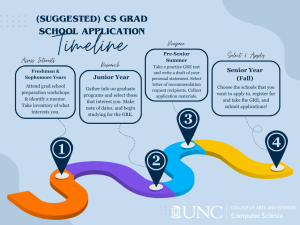
- Why Attend Graduate School in CS?
- Common reasons: specialization & expertise; advanced skills & opportunities; broader career opportunities; research experience
- Ultimately, there is no one-size-fits-all answer, and the decision should align with your career aspirations, personal preferences, and financial considerations
- M.S. vs. Ph.D.:
- Factors to consider:
- Money: Masters degrees are not always funded by the department. Most Ph.D. programs provide a stipend and pay for tuition for candidates, contingent upon graduate assistantships
- Time: Master’s programs are much shorter than Ph.D. ones, usually taking no longer than 2 years, vs. an average of 5-7 years for a Ph.D.
- Research vs. Industry Focus: Most master’s programs do not have as much of a focus on research as Ph.D. programs do. Master’s programs tend to focus more on industry preparation. Some MS programs are thesis-based, however
- Career goals: If being a professor or leading a research group is the long-term goal, then obtaining a Ph.D. is the better path to take. Getting a master’s typically prepares you for industry positions
- Application Materials:
- Letters of recommendation:
- Most graduate schools require at least 3 letters
- Individuals who know you fairly well: professors (whom you interacted with often), former supervisors, mentors
- Ask for recommendations at least two months before your applications are due
- Mission statement/letter of intent:
- Masters Applications: The focus is more on why you want to pursue the degree, how your coursework/experience translates into the program, and how a master’s would benefit you
- Ph.D. Applications: The focus should be more on research than anything, and how this particular program aligns with your own interests. Mention specific faculty and their work, etc.
- Sample here
- Additional Material(s):
- Academic Transcript(s)
- Resume/CV
- Application fees & financial aid documents (where applicable)
- GRE Test Scores
- Application Preparation & Timeline:
- Coursework:
- Take “core” CS classes such as Data Structures, Algorithms, Operating Systems, etc.
- Take electives based on your area of interest (ML/AI, Data Science)
- Check with each school to ensure that you have the right requirements
- GPA: schools typically prefer a 3.0 or higher, but sometimes 3.5
- Graduate Record Examinations (GRE) Preparation:
- Most programs require that you take the GRE
- Utilize resources such as The Princeton Review, Barron’s, practice tests, etc.
- International students: TOEFL scores are needed in addition to the GRE ones
- Research:
- Get involved in research at your institution as an undergraduate, in your area of interest
- Start preparing sooner than you think that you might need to. Most applications close by December!
- Additional Resources & Tips:
- Do your research into particular programs that interest you; do not just apply based on the name of the school
- Use some type of platform for staying organized (ClickUp, Asana, etc.)
- Network with professors at your top universities
- Resources:

